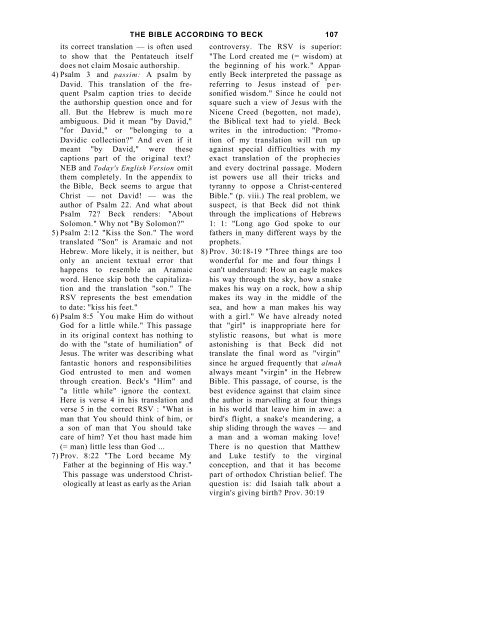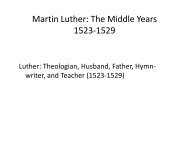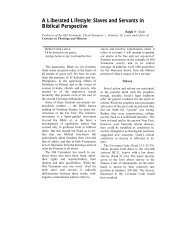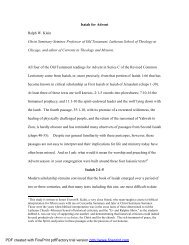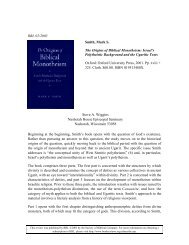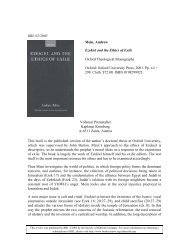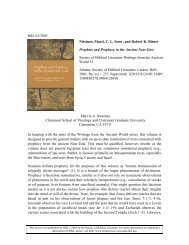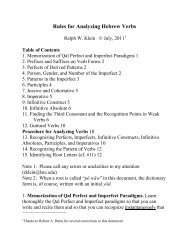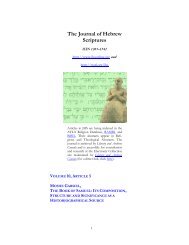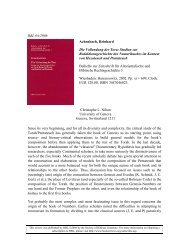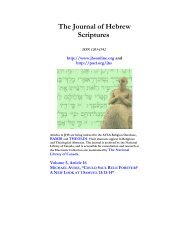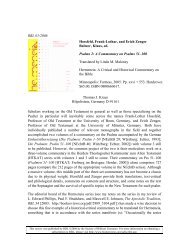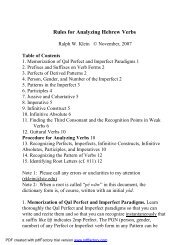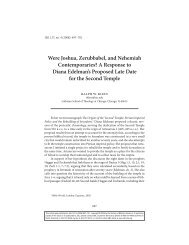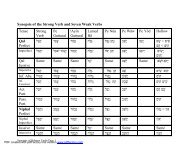The Bible According to Beck
The Bible According to Beck
The Bible According to Beck
Create successful ePaper yourself
Turn your PDF publications into a flip-book with our unique Google optimized e-Paper software.
its correct translation — is often used<br />
<strong>to</strong> show that the Pentateuch itself<br />
does not claim Mosaic authorship.<br />
4) Psalm 3 and passim: A psalm by<br />
David. This translation of the frequent<br />
Psalm caption tries <strong>to</strong> decide<br />
the authorship question once and for<br />
all. But the Hebrew is much mo re<br />
ambiguous. Did it mean "by David,"<br />
"for David," or "belonging <strong>to</strong> a<br />
Davidic collection?" And even if it<br />
meant "by David," were these<br />
captions part of the original text?<br />
NEB and Today's English Version omit<br />
them completely. In the appendix <strong>to</strong><br />
the <strong>Bible</strong>, <strong>Beck</strong> seems <strong>to</strong> argue that<br />
Christ — not David! — was the<br />
author of Psalm 22. And what about<br />
Psalm 72? <strong>Beck</strong> renders: "About<br />
Solomon." Why not "By Solomon?"<br />
5) Psalm 2:12 "Kiss the Son." <strong>The</strong> word<br />
translated "Son" is Aramaic and not<br />
Hebrew. More likely, it is neither, but<br />
only an ancient textual error that<br />
happens <strong>to</strong> resemble an Aramaic<br />
word. Hence skip both the capitalization<br />
and the translation "son." <strong>The</strong><br />
RSV represents the best emendation<br />
<strong>to</strong> date: "kiss his feet."<br />
6) Psalm 8:5 " You make Him do without<br />
God for a little while." This passage<br />
in its original context has nothing <strong>to</strong><br />
do with the "state of humiliation" of<br />
Jesus. <strong>The</strong> writer was describing what<br />
fantastic honors and responsibilities<br />
God entrusted <strong>to</strong> men and women<br />
through creation. <strong>Beck</strong>'s "Him" and<br />
"a little while" ignore the context.<br />
Here is verse 4 in his translation and<br />
verse 5 in the correct RSV : "What is<br />
man that You should think of him, or<br />
a son of man that You should take<br />
care of him? Yet thou hast made him<br />
(= man) little less than God ...<br />
7) Prov. 8:22 "<strong>The</strong> Lord became My<br />
Father at the beginning of His way."<br />
This passage was unders<strong>to</strong>od Chris<strong>to</strong>logically<br />
at least as early as the Arian<br />
THE BIBLE ACCORDING TO BECK 107<br />
controversy. <strong>The</strong> RSV is superior:<br />
"<strong>The</strong> Lord created me (= wisdom) at<br />
the beginning of his work." Apparently<br />
<strong>Beck</strong> interpreted the passage as<br />
referring <strong>to</strong> Jesus instead of " personified<br />
wisdom." Since he could not<br />
square such a view of Jesus with the<br />
Nicene Creed (begotten, not made),<br />
the Biblical text had <strong>to</strong> yield. <strong>Beck</strong><br />
writes in the introduction: "Promotion<br />
of my translation will run up<br />
against special difficulties with my<br />
exact translation of the prophecies<br />
and every doctrinal passage. Modern<br />
ist powers use all their tricks and<br />
tyranny <strong>to</strong> oppose a Christ-centered<br />
<strong>Bible</strong>." (p. viii.) <strong>The</strong> real problem, we<br />
suspect, is that <strong>Beck</strong> did not think<br />
through the implications of Hebrews<br />
1: 1: "Long ago God spoke <strong>to</strong> our<br />
fathers in many different ways by the<br />
prophets. "<br />
8) Prov. 30:18-19 "Three things are <strong>to</strong>o<br />
wonderful for me and four things I<br />
can't understand: How an eagle makes<br />
his way through the sky, how a snake<br />
makes his way on a rock, how a ship<br />
makes its way in the middle of the<br />
sea, and how a man makes his way<br />
with a girl." We have already noted<br />
that "girl" is inappropriate here for<br />
stylistic reasons, but what is more<br />
as<strong>to</strong>nishing is that <strong>Beck</strong> did not<br />
translate the final word as "virgin"<br />
since he argued frequently that almah<br />
always meant "virgin" in the Hebrew<br />
<strong>Bible</strong>. This passage, of course, is the<br />
best evidence against that claim since<br />
the author is marvelling at four things<br />
in his world that leave him in awe: a<br />
bird's flight, a snake's meandering, a<br />
ship sliding through the waves — and<br />
a man and a woman making love!<br />
<strong>The</strong>re is no question that Matthew<br />
and Luke testify <strong>to</strong> the virginal<br />
conception, and that it has become<br />
part of orthodox Christian belief. <strong>The</strong><br />
question is: did Isaiah talk about a<br />
virgin's giving birth? Prov. 30:19


